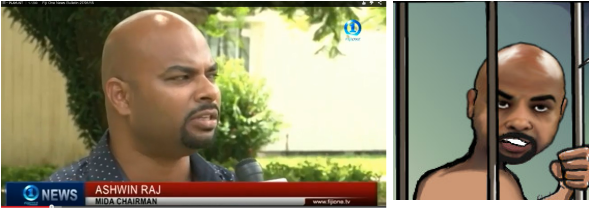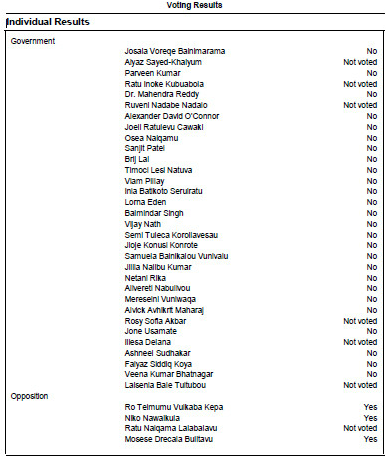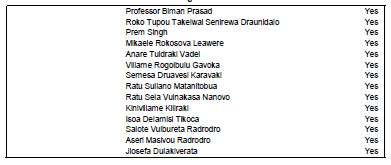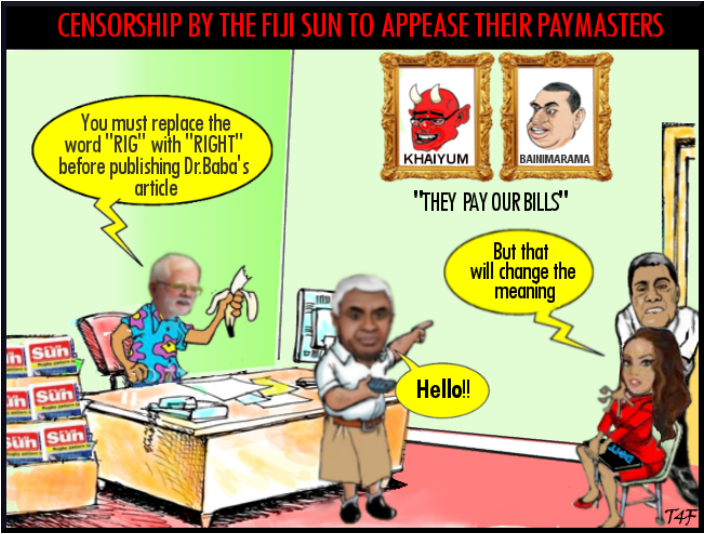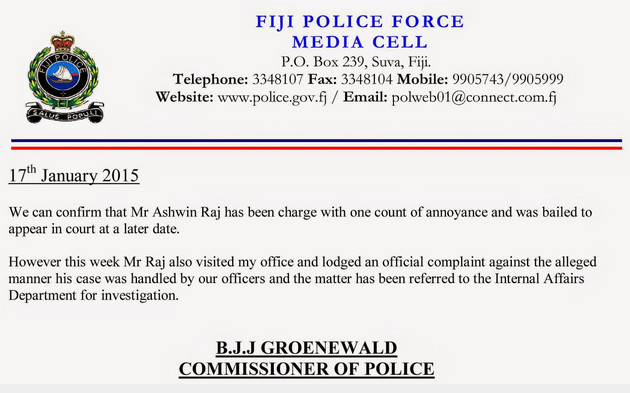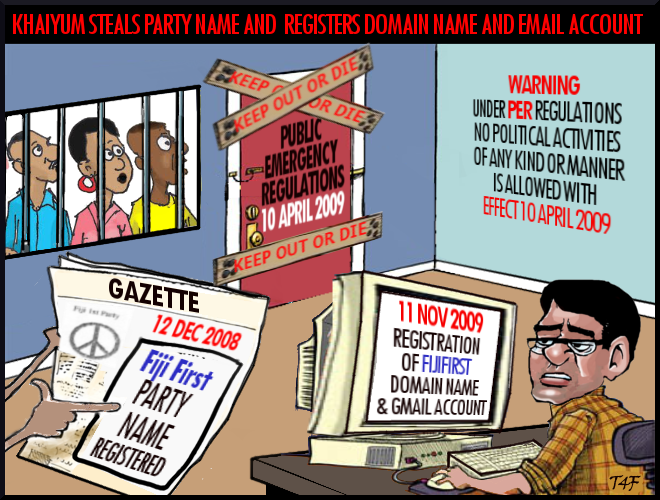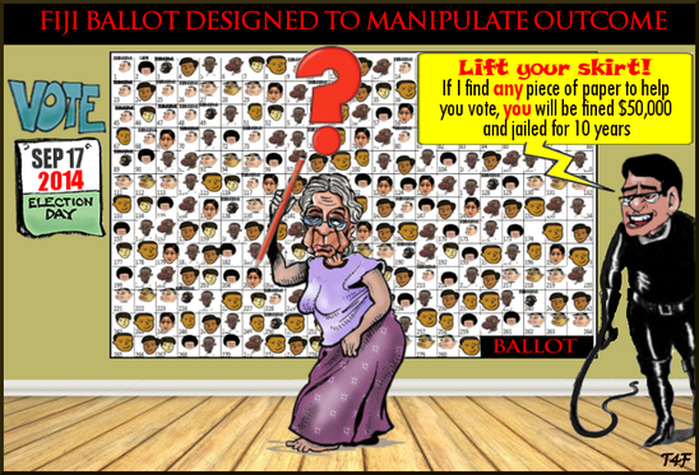"All public enterprises and government departments, must be totally free to communicate with the public through all available media, and not be limited by the government of the day, for purely party political reasons. Outrageously on that list is the Commerce Commission of Fiji whose supine biased media policy makes a total mockery of their own charter, vision and mission statements, whose focus is ensuring fair competition throughout the economy, including the media." - Wadan Narsey
Fijileaks: What Narsey omitted to mention is that Khaiyum gave exclusive advertising rights to Fiji Sun to ensure that the paper became a shameless FFP propagandist before and during the elections - now the job is done Khaiyum has meted the same medicine to Fiji Sun as he has done to certain individuals and institutions who had rushed to prop up dictatorship in Fiji - but only time will tell whether Fiji Sun will RISE UP!

Professor Wadan Narsey
At yesterday’s parliamentary sitting, the Leader of the National Federation Party (Professor Biman Prasad) moved a motion that any fair-minded member of the public would have thought was completely reasonable and should have been supported by both sides of the house, just as several government bills were, on the previous day.
The motion read: “That Parliament agrees that the Minister for Communication through Cabinet immediately review the decision of exclusivity in terms of advertising in one newspaper in conformity to Sections 17, 25, 26 & 32 of the Constitution”.
The motion essentially asked the Government to treat The Fiji Times on the same level playing field as it did the Fiji Sun by placing its advertisements equally in both newspapers.
During the debate, it was admitted by the Fiji Government that in recent years, the Fiji Government had made a decision (documented) to place all its advertisements in the Fiji Sun, and discourage any in The Fiji Times.
As a rough guess, this government bias annually directs more than $5 million to the Fiji Sun, even taking into account the few advertisements placed with the Fiji Times in the last few weeks.
The facts about the newspaper media are that: the Fiji Times and the Fiji Sun are both privately owned; the Fiji Times has as high a circulation if not more, than the Fiji Sun; most readers, and especially the poorer people, cannot and do not buy both newspapers.
The Opposition Arguments
Dr Prasad argued from several points of view, with full support from all Opposition parliamentarians.
First, it must be emphasized that the funds used by Government and public enterprises belong to all tax-payers, and not just those who supported Fiji First Party in the last elections.
Second, the public who read the Fiji Times, had the basic human right as guaranteed by the Constitution, to know what was contained in the advertisements put out by the government and the public enterprises, just as much as those who read the Fiji Sun.
To deny the Fiji Times readers this essential public service was a gross denial of their human rights.
It was also a gross example of callousness on the part of Government, that they refused to advertise with arguably the most popular newspaper and maximize their outreach to the taxpayers, because government wanted to penalize a newspaper which may have disagreed with government on some issues, as any free press is entitled to.
Third, the Fiji Times, as a private media company owned by Motibhai Patel, had the basic right to be treated on the same level playing field as the Fiji Sun, owned by CJ Patel, without favor or prejudice.
Fourth, the workers employed by the Fiji Times, had the same rights of protection of their jobs and incomes, by the government, as the workers employed by the Fiji Sun.
We might point out that not too long ago, the Bainimarama Government made a big song and dance about the rights of all rugby enthusiasts in Fiji to watch rugby sevens, and that therefore FBC TV must be given the feed, by decree if necessary, from Fiji TV.
All the often spouted principles about ‘level playing fields’ are not being applied to the Fiji Times and Fiji Sun.
The Bainimarama Government responses
It was extraordinary of the Attorney General to point out that the Fiji Times had not laid off any workers despite the discrimination against them in advertisements and revenue.
That is surely far more a reflection of the quality of the newspaper, its journalists and its content, than anything else.
[A little-known (or well-known depending on which circles you move in) is that even journalists working in government owned television and radio stations, prefer to read the Fiji Times than Fiji Sun, which is being given away for free throughout the country.]
The Fiji Times has survived, despite the significant revenue disadvantage (annually $5 millions) because of the denial of public sector advertisements.
It was extraordinary of the Attorney General to wave around a few Fiji Times papers to allege that the Fiji Government was not exclusively advertising with the Fiji Sun.
Sure, a few advertisements have been placed with the Fiji Times, but only in the last few weeks.
More importantly, the overall balance has been grossly in favor of the Fiji Sun, which probably receives fifty times more advertising revenue weekly than the Fiji Times.
It was an extraordinary red herring of the Attorney General, and a callous misuse of a recent brutal attack on a child, to bring into the debate, the fact that the Leader of the Opposition refuses to read the Fiji Sun, and was not aware of the assault on a nine year old girl.
It was an extraordinary red herring of the Attorney General to tell parliament that one of the directors of the company owning Fiji Times was a ‘fugitive’ in Australia, facing criminal charges in Fiji, when that director has nothing whatsoever to do with the Fiji Times.
How extraordinary of the Attorney General to point out that the Fiji Times refused to give the Government free space to advertise the government’s proposed flag designs, as the Fiji Sun did.
But of course, the Fiji Sun could afford to be ‘generous’ and ‘act in the public interest’ given that it receives a preferential revenues of $5 million per year- of taxpayers funds.
The Attorney General and the Minister of Finance ought to know that it is totally wrong of the Fiji Government to ask a private company for ‘free services’ and then to penalize it when it does not agree.
Government must deal with all private companies at ‘arms length’ and in a totally transparent and accountable manner.
During the debate on this motion, there were very reasonable and passionate appeals by Opposition members such as the Hon. Professor Biman Prasad and the Hon. Viliame Gavoka, who pointed out how they had supported all the Government bills the previous day, on principle, and they pleaded with Government to treat this motion similarly.
To no avail.
Despite all the valid arguments supporting the motion, and all the hollow arguments from the Attorney General (the only speaker from the Government side speaking because of prior agreement in the Business Committee), the motion was defeated, 26 votes against to 17 for, with the Government side voting as a block.
It is has to be considered a day of shame for Government members of parliament, most of whom I suspect, would have liked to have supported the motion.
Wider lessons
There are many sad lessons raised by this motion, the debate and the final vote.
The motion listed 60 government departments and public enterprises, which for the last few years, have been advertising exclusively with the Fiji Sun, thereby denying the taxpayers their right to full information about what the government and public enterprises are doing.
Among them are any number whose total autonomy and work must never be compromised by any government of the day.
All public enterprises and government departments, must be totally free to communicate with the public through all available media, and not be limited by the government of the day, for purely party political reasons.
Outrageously on that list is the Commerce Commission of Fiji whose supine biased media policy makes a total mockery of their own charter, vision and mission statements, whose focus is ensuring fair competition throughout the economy, including the media.
What utter spinelessness of the public enterprises and corporations, who are supposed to operate efficiently and fairly in the interests of all taxpayers, yet have given in to the government’s biased media policy.
Also to be noted by the Fiji taxpayers, is that the MIDA Chairman (Ashwin Raj) who once upon a time not too long ago, was regularly pontificating in the media, in obscure language, on the critical need for the regulation of the media, has been singularly silent on the rights of all media organisations to fair treatment by the government.
The Attorney General announced that Government was calling for expressions of interest from media companies so that government could rationalize and advertise more efficiently using tax payers’ funds.
Well and good.
As a major buyer in the market, government has a massive monopsony power to reduce its advertising costs through negotiation with all the media organizations.
But, and it is a big BUT, a minimum policy must be that all large media organizations must receive government advertisements, and at the same rates, without favor or prejudice, either with respect to the volume of advertisements or the price paid.
Note that the Opposition Parties should now also consider introducing a similar motion regarding the fair use of tax-payer funds, as advertisements, subsidies, or loan guarantees, through television stations, and radio stations, whether they are owned by government or private interests.
The government financial bias towards government owned television and radio stations run by the totally pro-government brother (Riyaz Khaiyum) of the Attorney General (Aiyaz Khaiyum) is another scandal which will be uncovered in the fullness of time.
Freedom of the media and true democracy has a long way to go in the post-election Fiji.
The harsh lesson for Fiji’s ‘parliamentary democracy’
The voting results on this motion is also another bad news for the country and a portent of things to come, if FFP parliamentarians continue to make ethics subservient to party solidarity.
Whether the government MPs voted as a block on this Opposition motion was out of fear of their party bosses or because of single-minded devotion to party solidarity, it is bad news for the people of this country and for Fiji First Party supporters.
Given that the Opposition’s motion was completely in the interests of the nation by all the criteria listed in this article (citizens’ basic right to information, private company rights to equality of treatment, workers rights to jobs and incomes), the decision of the FFP parliamentarians to vote against the motion, indicates their willingness to sacrifice the nation’s interest for their own selfish interests.
This might be so given that the results of the 2014 elections indicated that only two of the FFP parliamentarians had more than ten thousand votes, and that nearly all the FFP parliamentarians owe their position in parliament purely to the support of Bainimarama, not due to their own personal support.
Many FFP parliamentarians currently very prominent (and brash) in the media, had less than 1,000 votes, and the last one to enter, a mere 814 votes.
The voters of Fiji should expect the FFP parliamentarians to show no spine or ethics on all future Opposition motions, regardless of their benefit to the country.
It is interesting that, on the flag issue, even well-known and admitted FFP supporters are begging Bainimarama to listen to the people of the country and have a referendum.
https://narseyonfiji.wordpress.com/2015/07/11/to-level-the-media-playing-field-edited-version-in-the-fiji-times-11-july-2015/
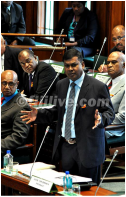
Madam Speaker
I rise to move the following Motion: -
“That Parliament agrees that the Minister for Communication through Cabinet immediately review the decision of exclusivity in terms of advertising in one newspaper in conformity to Sections 17, 25, 26 & 32 of the Constitution”
Madam Speaker, at the outset let me state that Government’s decision to exclusively advertise in The Fiji Sun violates Sections 17, 25, 26 and 32 of the 2013 Constitution in respect of all those employed at The Fiji Times and the people of Fiji.
These are the Right to Freedom of speech, expression and publication, Right to Access to Information (Section 25) Right to equality and freedom from discrimination (Section 26) and the Right to economic participation (Section 32). And I will explain why these rights are violated.
Madam Speaker, We strongly believe the rights of the Fiji Times as an organisation is violated, as it is locally owned. This is totally against Government’s professed principle of equal citizenry, which it says is the cornerstone of the 2013 Constitution. Similarly the right of the people to freedom of speech, expression, thought, opinion and publication, which primarily is freedom to seek, receive and impart information, knowledge and ideas – under Section 17 of the Constitution.
Ultimately, the right of the people is suppressed in terms of denial of access to information, especially those who do not subscribe to or buy the Fiji Sun. The rights breached are Section 17 (a) (Freedom of speech, expression and publication – freedom to seek, receive and impart information, knowledge and ideas, Section 25 (Access to information).
It results in the people who predominantly buy only a single newspaper (either Fiji Times or Fiji Sun), being denied information resulting in the breach of basic rights such as right to work, economic participation, to name a few, being denied access to these advertisements. This is unacceptable.
Madam Speaker, There is no legitimate reason to deny the Fiji Times and its employees income as well as its reader’s information. With the exception of the Fijian Elections Office, which sometimes advertises in both newspapers, but mostly in the Fiji Sun.
Madam Speaker, Only recently we have seen a few advertisements on the campaign to change the flag, a lift-out on Government’s consultation for development of a 5 year and 20 year plan and vacancies of the Auditor-General and Fiji Corrections Service Commissioner
Government and statutory organisations solely advertise in the Fiji Sun. This was a policy adopted by the military government after what it claimed was Fiji Times anti-regime stance. This was confirmed in 2010 by the then Government’s spokesman, a senior military officer ,who said in January 2010 that since 2009 all advertisements must be in the Fiji Sun.
Madam Speaker, We now have parliamentary democracy. If anything, tenders are called for any service required by Government. We are sure this was never done and still has not been done.
But for the sake of fairness, impartiality and dissemination of information in the widest possible manner, it s imperative that both newspapers are given advertisements for publication. Government is not anyone’s personal property and to use taxpayer funds for the corporate benefit of one newspaper and in the process denying people fair access to information breaches the rights of the people and the newspaper.
However Madam Speaker, even after the return to democracy following last September’s general elections, government continues its exclusivity policy in terms of advertising.
I have in possession a copy of an e-mail sent by the Department of Information to Media Liaison Officers of all Ministries and Departments. The urgent e-mail dated 18th November 2014 is self-explanatory and I quote: -
”As per Cabinet decision on Government Department and Ministries advertising with the Fiji Times, please note that only the Permanent Secretary for Information on the advice of the Minister has the authority to approve Government Departments and Ministries to advertise in the Fiji Times newspaper. Further, the approval by the Minister and the Permanent Secretary can only be made once the requesting Departments or Ministries has advised on the necessity and importance for wanting to advertise in the Fiji Times newspaper. Please bring this to the attention of your senior colleagues, in particular your Corporate Department”. – Unquote
Clearly Madam Speaker, the decision to exclude the Fiji Times is not a cost-based decision, as the e-mail shows. It is unacceptable to the readers of the Fiji Times, easily the largest newspaper in terms of circulation (and this newspaper is not distributed free unlike its competitor), and to the people of Fiji that they are excluded from Government information, vacancies, tenders and other important information.
Madam Speaker, another example of Government clearly favouring the Fiji Suneven while responding to opinions expressed through the letters to the Editor column in the Fiji Times following a news report in the newspaper about Draunibota Bay development and its potential hazards to the environment, printed in April, attracted a Government response, only through the Fiji Sun. And that too in a paid advertisement by the Permanent Secretary for Local Government, Housing and Environment.
Madam Speaker, we have compiled a list of some 60 government ministries, departments and statutory organisations whose advertisements appear almost on a daily basis in the Fiji Sun and comprehensively on Saturdays.
They are: -
1. Ministry of Lands
2. Ministry of Public Enterprise
3. Ministry of Tourism
4. Ministry of Foreign Affairs
5. Ministry of Justice
6. AG's Chambers
7. Ministry of Energy
8. Ministry of Health
9. Ministry of Environment, Housing & Urban Dev.
10. Min for Women & Social Welfare
11. Min of Employment Productivity and Industrial Relations
12. Min of Education
13. Min of Defence National Security and Immigration
14. TLTB
15. Commerce Commission
16. Public Trustee of Fiji
17 Govt. Shipping Services
18. Govt. Statistician
19. Controller of Govt Supplies
20. Co-operatives Dept
21. MAFF
22. Fiji Military Forces
23. Dept. Information - Communication
24. Marine Dept
25. Min. of Trade & Industry
26. Min. of Finance
27. Min. of Labour
28. Min. of Education
29. Min of Local Government and Town and Country Planning
30. Water Authority of Fiji
31. Fiji Sugar Corporation
32. Airports Fiji Ltd
33. ATS Fiji Ltd
34. Fiji Hardwood Corp.
35. Fiji Museum
36. Fiji Ports Corp.
37. Fijian Property Trust Co. Ltd
38. Dept. of Legislature
39. Tropik Wood Industries Ltd.
40. Tourism Fiji
41. National Fire Authority
42. Housing Authority
43. Reserve Bank of Fiji
44. Post Fiji
45. Fiji Electricity Authority
46. FIRCA
47. Land Transport Authority
48. Prime Minister's Office
49. Investments Fiji
50. Town Councils and Regional Authorities
51. Fiji Airways
52. Fiji Link
53. Legal Aid
54. President's Office
55. Fiji Roads Authority
56. FNU
57. PSC
58. Technical College of Fiji
59. Dept. of Public Prosecution
60. Biosecurity of Fiji
Madam Speaker, the Standing Committee on Natural Resources, in its report on the petition not to re-zone Shirley Park (parliamentary paper 25 of 2015), discovered during its hearing that many people who appeared before the Committee were not aware of public announcements and advertisements on the issue. The Committee recommended that the responsible authorities must advertise notification of rezoning, objection periods, public consultations etc. through all available media outlets.
In the case of Lautoka’s Shirley Park, this was only advertised in the Fiji Sun. Even Parliament advertised the Standing Committee hearings in the Fiji Sun.
Madam Speaker, this blatant disregard and violation of constitutional rights, employment and natural justice must cease.
If Government genuinely believes in equal citizenry, it should immediately discard its policy of exclusivity as far its newspaper advertising.
Madam Speaker, I commend this Motion to the House.
